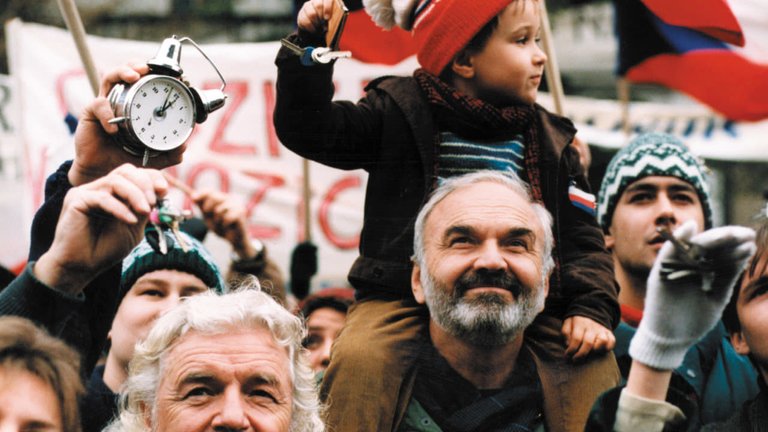Retro Film Review: Kolja (Kolya, 1996)

Infantilism is one of the worst ailments suffered by modern Hollywood. So many potentially great films were ruined by adorable little child being unnecessarily brought among major character or simply by trying to pander to the youngest possible audience. On certain occasions this practice can be beneficial, and in 1990s this was discovered by some non-American film makers, especially those interested in getting much-coveted Foreign Language "Oscars". One of the film to succeed in this was Kolja, 1996 Czech comedy directed by Jan Svěrák.
The plot of the film begins in Czehoslovakia 1988, twenty years since that country's experiment with gentler, kinder and more independent sort of Communism abruptly ended with Warsaw Pact invasion. Like most of his countrymen, 55-year old cellist František Louka (played by Zdenek Svěrák) is unhappy with the regime brought by Soviet tanks. Unlike most of his countrymen, he once made fatal mistake of expressing those feelings to regime's officials and thus lost his job in state's philharmonic orchestra. František now has to earn a living through menial jobs, but his good looks and constant success with women provide some sort of comfort. However, accumulating debts and need to buy a car would force František to end his hedonistic lifestyle, at least for a while. He agrees to formally marry Nadezhda (played by Irina Livinova), young Russian woman, in order to prevent her deportation to Soviet Union. His only motive is financial compensation for that formality, but in the end he gets more than he bargained for. Nadezhda escapes to her boyfriend in Western Germany and leaves her 5-year old son Kolja (played by Andrei Chalimon) behind. František, who doesn't have a clue about childcare and can't even speak the same language as his stepson, is suddenly forced to be little boy's legal guardian. After his attempts to find a better solution for Kolja fail, he gradually begins to like the boy. In the meantime, as Communism slowly begins to crumble, František has to deal with his Russian-hating countrymen and secret policemen who saw through whole false marriage scheme.
The basic concept behind Kolja - flawed, irresponsible adult being transformed by unexpected and unwanted parenthood - has been used in many films. What makes it refreshingly original in this film are the setting and specific storytelling style of the Czech cinema industry. During Communist era Czech film makers circumvented censorship by concentrating on "little" people and using very Czech brand of humour. Zdenek Svěrák, main actor and film's scriptwriter, was quite aware of those techniques and applied them very well to describe the twilight of Communism in his country. Most of the gags in this film aren't directed at the dying regime, but on its victims - people of whom many took the path of least resistance and whose verbal patriotism was often excuse for conformism and apathy. Another dimension in the film is cultural clash between Russians and Czechs, which creates not only opportunity for extra humour, but also illustrates the way Czech people in those years perceived their oppressors. Political background also serves to underline the uplifting character of the film - as František and Kolja gradually overcome their cultural differences and reaching seemingly impossible understanding and affection, another sort of miracle is slowly appearing in the form of the events that could lead to Velvet Revolution. Many of the small but interesting details in the film would be, unfortunately, missed by viewers who haven't had first- hand experience of Communism or who aren't familiar with that particular period of European history.
Zdenek Svěrák was in this film directed by his own son Jan, and with results that in many ways can match similar intergenerational collaboration between Hustons in The Treasure of the Sierra Madre. Zdenek Svěrák is very impressive in his role of "small", flawed but in the end quite noble and decent character. His little partner Andrei Chalimon is also very convincing as adorable little brat. Libuše Safránková is also very good in the role of František's would-be girlfriend. The film also benefits from good use of music, with Ondrej Soukop combining works of classic Czech composers with his own. The only flaw of the film is somewhat too abrupt ending which uses 1989 Velvet Revolution more like a sideshow than real dramatic catharsis.
Yet, even without being perfect, Kolja is a film that proves that occasionally pandering to someone's sentiments can result in a film of remarkably high quality.
RATING: 8/10 (+++)
(Note: The text in its original form was posted in Usenet newsgroup rec.arts.films.reviews on March 16th 2004)
Blog in Croatian https://draxblog.com
Blog in English https://draxreview.wordpress.com/
Cent profile https://beta.cent.co/@drax
Minds profile https://www.minds.com/drax_rp_nc
Uptrennd profile https://www.uptrennd.com/user/MTYzNA
Brave browser: https://brave.com/dra011
BTC donations: 1EWxiMiP6iiG9rger3NuUSd6HByaxQWafG
ETH donations: 0xB305F144323b99e6f8b1d66f5D7DE78B498C32A7
